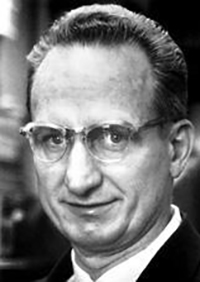Leo James Rainwater was an American physicist and winner of the 1975 Nobel Prize in Physics.
As a graduate student at Columbia University, Rainwater assisted the Manhattan Project through research in the Substitute Alloy Materials (SAM) Lab. He also worked with John R. Dunning and Enrico Fermi on the Columbia cyclotron.
Scientific Contributions
He received his Ph.D. in 1946 after his thesis was declassified. He taught at Columbia, becoming a full professor in 1952, and worked with the Office of Naval Research to build a synchrocyclotron, researching neutron resonance spectroscopy. He began developing a theory in 1949 that not all atomic nuclei were spherical in nature. This hypothesis was later confirmed with the help of Aage Niels Bohr and Ben Mottelson, and the three were awarded the 1975 Nobel Prize in Physics “for the discovery of the connection between collective motion and particle motion in atomic nuclei and the development of the theory of the structure of the atomic nucleus based on this connection.”





